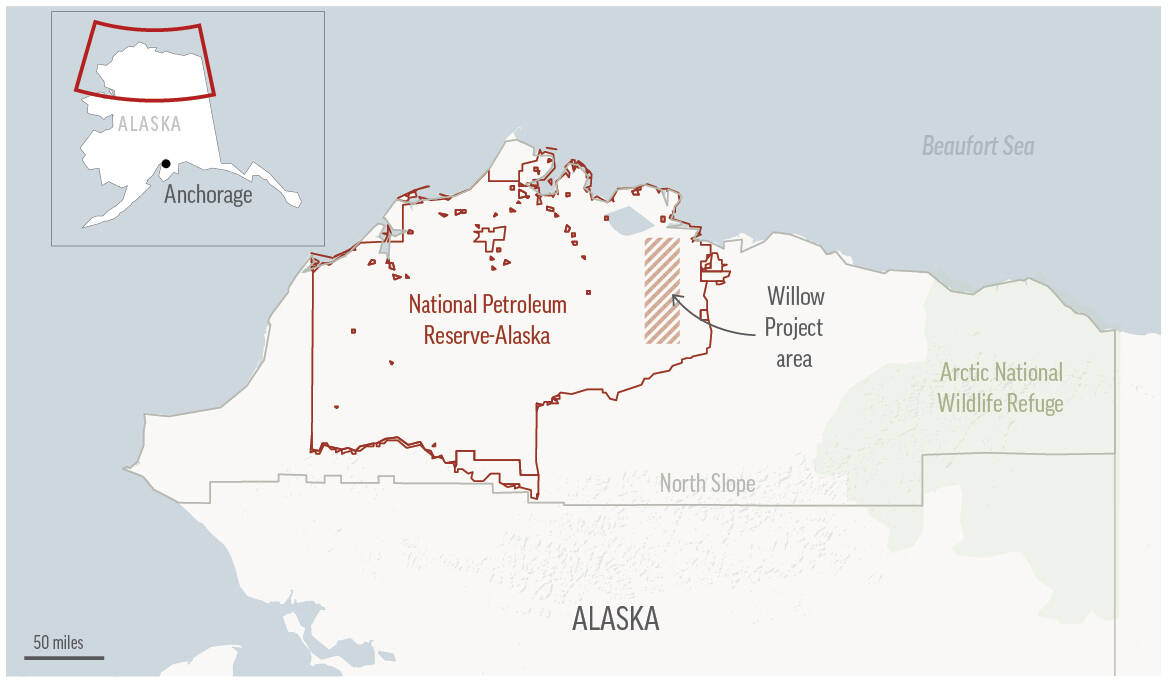Construction can proceed related to a major oil project on Alaska’s petroleum-rich North Slope after a federal judge on Monday rejected requests to halt work until challenges to the Biden administration’s recent approval are resolved.
The decision means ConocoPhillips Alaska can forge ahead with cold-weather construction work, including mining gravel and using it to extend a road toward the Willow project.
U.S. District Court Judge Sharon Gleason said support for the project by Alaska political leaders — including state lawmakers and Alaska’s bipartisan congressional delegation — was a key factor in her decision. She said she gave “considerable weight” to the support for Willow by an Alaska Native village corporation, an Alaska Native regional corporation and the North Slope Borough, while also recognizing that support for the project among Alaska Natives is not unanimous.
Environmental groups and an Alaska Native organization, Sovereign Iñupiat for a Living Arctic, had urged Gleason to delay construction related to Willow. In separate lawsuits, they ultimately want Gleason to overturn the project’s approval, saying the U.S. Bureau of Land Management failed to consider an adequate range of alternatives.
To prevent the worst of climate change’s future harms — including even more extreme weather — the head of the United Nations recently called for an end to new fossil fuel exploration and for rich countries to quit coal, oil and gas by 2040.
A ConocoPhillips Alaska executive, Stephen Bross, in court documents warned that an order blocking construction could make it “impossible” for the project to begin production by Sept. 1, 2029, and that the company risks having its leases expire if the unit hasn’t produced oil by then.
One of the suits, filed by Earthjustice on behalf of numerous environmental groups, says the government analyzed an inadequate range of alternatives “based on the mistaken conclusion that it must allow ConocoPhillips to fully develop its leases.” It also says the environmental review underlying Willow’s approval didn’t assess the full climate consequences of authorizing the project because it didn’t analyze greenhouse gas emissions from other projects in the region that could follow.
The Willow project is in the northeast portion of the National Petroleum Reserve-Alaska, where there has been debate over how much of the region should be available to oil and gas development.
The Biden administration in 2022 limited oil and gas leasing to just over half the reserve, which is home to polar bears, caribou, millions of migratory birds and other wildlife. There are multiple exploration and development projects within 50 miles (80 kilometers) of the Willow project, including other discoveries being pursued by ConocoPhillips Alaska, the largest oil producer in the state.
The other lawsuit over the Willow project, filed by Trustees for Alaska on behalf of Sovereign Iñupiat for a Living Arctic and environmental groups, said federal agencies failed to take a “hard look at the direct, indirect and cumulative impacts” of Willow and that the U.S. Fish and Wildlife Service failed to address impacts to polar bears, a threatened species under the Endangered Species Act.
Bridget Psarianos, lead staff attorney with Trustees for Alaska, in a statement called Gleason’s decision “heartbreaking for all who want to protect local communities and prevent more devastating climate impacts in the Arctic and around the world. We will do everything we can to protect the region while the merits of our case get heard.”
Justice Department lawyers had argued that last month’s decision by the Biden administration approving Willow was “based in science and consistent with all legal requirements.” They also said the environmental review thoroughly analyzed emissions related to the use of oil produced by the project and that the analysis sought by Earthjustice is overreaching.
State political leaders and labor unions have touted Willow as a job creator, expected to send up to 180,000 barrels of oil a day through the trans-Alaska pipeline. That’s significant, because major existing fields are aging and the flow of oil through the pipeline is a fraction of what it was at its peak in the late 1980s.
Many Alaska Native leaders on the North Slope and groups with ties to the region have argued that the project is economically vital for communities in the region. But some Alaska Native leaders in the community closest to the project, Nuiqsut, have expressed concerns about impacts to their subsistence lifestyles, and worried that their voices haven’t been heard.
Using the oil that Willow would produce over the 30-year life of the project would emit roughly as much greenhouse gas as the combined emissions from 1.7 million passenger cars over the same time period. Climate activists say the project flies in the face of President Joe Biden’s pledges to cut carbon emissions and move to clean energy.
But the Biden administration has defended the decision on Willow and the president’s climate record. Interior Secretary Deb Haaland, who opposed Willow when she was a New Mexico congresswoman, called the project a “difficult and complex issue” involving leases issued by prior administrations. She said there was “limited decision space” and that the administration “focused on how to reduce the project’s footprint and minimize its impacts to people and to wildlife.”
Global demand for crude is expected to continue rising, according to industry analysts and the U.S. Energy Information Administration.

